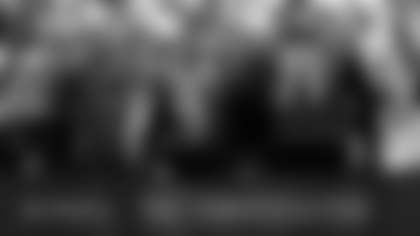Bengals president Mike Brown, who turns 89 the day his team opens its preseason in an Aug. 10 game against Tampa Bay at Paycor Stadium, heads into his 74th training camp with an NFL club next week.
And he still loves it.
Just as much as when he turned 11 during the 1946 camp run by his father, Paul Brown, the first-year coach of the Cleveland Browns.
Bengals.com senior writer Geoff Hobson wanted to know why and Brown told him in their conversation.
After a spring in which he broke up his 8-5 day with vigorous walks in and around Paycor Stadium while also chairing personnel meetings and watching practice, Brown spent part of last week preparing for Monday's training camp luncheon at Paycor Stadium that unofficially starts the NFL season in Cincinnati, as well as his annual remarks to the team.
He also sat for The Conversation:
GH: Another training camp. You've been doing this since the '40s and you love it. Why?
MB: I grew up with training camps. From the time I was a small boy, I went to training camp. I thought that was a great spot to go. When I was a kid, I looked forward to it. It was a treat for me to be able to go watch the practices. Be around the locker room. Be out on the field. And I've never lost that liking for it.
It's simple. You would stay in college dorms. They were unadorned. The food was always good. I'd get to watch and we would talk about the players in meetings. It was something I would do if I could take a vacation. And that was true when I was 12 years old and it's true when I'm 88 or 89 years old today.
It's a great thing in your life when you get to do what you like. For me, a lot of the fun went beyond watching practice. It was just being around the team and watching it come together, talking about it, and doing the things that had to be done off the field as well as the things that go on on the field.
GH: There are no more college dorms, but do you feel like you're 12 years old when you're watching this current edition of the Bengals?
MB: It's very similar to how I felt when I was just a kid. It was just fun for me to watch players do what they do. You're in a way judging them, but you're also admiring them because they're so good at what they do. They can run so fast, jump so high, if you will. They show their athleticism as they practice. And that's a fun thing to observe.
GH: Who is fun for you to watch on this team?
MB: It's fun to watch the receivers we have. They are talented. I like to watch every group. When I watch the linebackers, I like to watch the way they drop, react, fill. I like to watch the offensive linemen when they do drills together with the defensive line. You get to see quickly who can pass protect at this level. It's a question of balance and strength and anticipation and how you use your arms and protect yourself. It's a lot of things going on in a flash. Maybe it makes you think of sumo wrestling. It's fun to watch those guys go about it. Both sides.
GH: As a former quarterback, you seem to have fun watching Joe Burrow.
MB: He's exceptional as a player. He has a set of attributes that are almost uniquely his. He does it cerebrally. He knows what he's looking at. He has really studied the game. The closest one to him would be Peyton Manning. He was that way. He knows where to put the ball and he knows it sooner than the defense knows it. That's a trait of his that is outstanding. He's very accurate. He has mobility. Exceptional mobility within the pocket. He senses where he has to move when he has to move. How he has to move. He has a unique set of traits that make him exceptional.
GH: You've watched a lot of quarterbacks. I mean, when you were 12 years old, you were watching Otto Graham, so you know what the great ones look like.
MB: Well, I know how Otto looked. He was exceptional. He was very athletic. He was good-sized. He could move in the pocket, outside of the pocket, he could throw on the run. If he had to, he could carry the ball effectively. But he was careful about it. He knew that he shouldn't put himself at risk unless the money was on the line. And then he would. But otherwise, he'd protect himself.
He was for me the standard. I still think of him as the best quarterback ever. Time has gone by, so he is faded from the memory of almost everyone. But I do remember him from the time he started in pro football and how he played. He carried the team. Joe carries the team. With Joe, we can play with anybody. Otto was the same way. He did that for the old Browns.
GH: It doesn't seem possible, but this is the 25th season for the stadium you fought to build.
MB: I've always been proud of it. I think it's a good feature to our skyline. When it was built, it was considered top of the line as a stadium architecturally. It won an award for that. This building is appropriately sized, appropriately built.
Interestingly in our division, we have Cleveland, Pittsburgh, Baltimore and us and the stadiums in those cities are not domed. They're football stadiums and they're effective for those communities which are similar in size to Cincinnati. They tried to answer it the same way we did. I think it has worked for all four of those communities.
GH: Any games that stand out to you? Any crowds or moments that stand out here during those 25 years?
MB: I remember a lot of moments. I remember some great moments and I remember some hard, disappointing moments as part of it all. I don't want to say I favor one over the other. We've won some games that were hugely exciting and fun. The game we had with Kansas City here a few years ago was one that would fall into that category. But there have been a number of them over the years.
GH: The crowds lately have been tremendous, particularly the prime-time atmosphere.
MB: I think our crowd knows what it's about. When we first started out, Cincinnati hadn't been a pro football town, if you will. There had been a team a few years before, but it was a minor-league team of sorts. When we came here, first it was just more curiosity with some of them. Over the years the fanship grew in intensity. Families would go to the games. Fathers and sons would go to the games together and it became a family practice.
It was ingrained on younger people. And now we have three generations or more later that have come to these games and feel that it's part of their family tradition. That to me is the very essence of what we do. To build that kind of fan base. It's a pastime they're familiar with now. They know what they're seeing. And they're connected to the team and they show it. It's exciting. It's great fun. It's just a privilege to be a part of it for me.
GH: Two new Ring of Honor members and you saw Corey Dillon and Tim Krumrie in every Bengals game they played. Those are two of the more rugged and productive guys that ever came through here.
MB: They were different in their personalities, but on the field they had great effort. Both of them. And they were good players, physically. I'm not trying to discount that for sure. They had structure. With Timmy, even today, if he grabs you on the shoulder in a form of endearment, you feel as though he's taken you over. He's powerful. His arms are still powerful. Corey was a real solidly put together running back. And a big running back. He went north-south as they say. He was just a 100-yards-per-game running back.
GH: The speech that you give to the team when training camp starts is kind of a rite of passage around here.
MB: I've drifted away some from what I used to do. I used to just talk to them about the people that came before and then give them a sense of who built the franchise. What they were like, why they should know about these people because they're part of that tradition, which is a continuing tradition.
These days, when I do that, I merely get up and wave the flag and sit down. But it's fun for me to see the players when you're up in front of them. I think it's a good thing for them to have a chance to see the ownership of the team. Get to know that we're as tied into this as we are, and it isn't just me. It's the whole family.
GH: Do you have a message you like to leave them? I know you've mixed it up down through the years.
MB: I do some years when I'm talking about the history … We are trying to make it so that they feel they are listened to. To let them know we hear them.
GH: The year after the Super Bowl, your message was, 'Let's finish it.'
MB: Every year there's the same goal. But we have a group now that has the ability to do that. It doesn't mean we're the only one that's going to be in the race, but we're one in the race that matters. So we'll see how it ends up. But they know in their hearts they can. You have to be lucky. You have to win some close games. You have to get the bounce of the ball. But when you have enough horses, and we do, you can go out there with a good chance.
GH: Do you have a theme for this year?
MB: You can come and find out.















